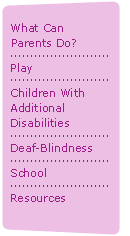|

|
 Education
& Development Education
& Development
When
parents find out that their child is blind or visually
impaired, they often wonder how the child's eye condition
will affect development and how the child will get an
education. Too many times, the information they read
about blindness and visual impairment is negative and
depressing. They might hear, for instance, that 80%
of learning is visual. Well, we're here to say that
that's only true for fully sighted kids! For our children,
learning will come through touch and hearing and smell
and taste and movement, as well as through any vision
the child may have. Your child may be blind/visually
impaired, but all is not lost! Blind children can do
well in school, participate in sports and extracurricular
activities, contribute to the community, go to college,
and accomplish just about anything their sighted classmates
can.
The
blind/visually impaired child with additional disabilities
often benefits from the same kinds of stimulating activities
as the sighted child of similar cognitive ability. In
fact, it is helpful to ask teachers, therapists, and
early intervention providers what kinds of activities
they would do with a sighted child with a similar learning
profile, and then add the materials and techniques for
blindness/visual impairment. We hope the additional
ideas and resources in the section Children
with Additional Disabilities will be helpful
to you.
|


 Education
& Development
Education
& Development